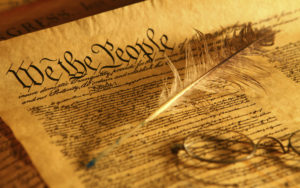A former colleague and critic of this blog made a fascinating — and legitimate — point while participating in an exchange about a post I wrote about a guest columnist whose work appeared recently in the Amarillo (Texas) Globe-News.
I asserted in my own critique of the essay that the nation’s founders established a “secular government” when they wrote the U.S. Constitution.
My former colleague/critic pointed out that the nation comprises a population “of Christians” and that the nation was founded on “Judeo-Christian principles.” I agree with his assertion about the nation and that the founders likely were motivated by their deep religious faith.
However, that doesn’t dissuade me from insisting that the Constitution is as secular a document as it possibly can be.
The founders were direct descendants of people who migrated across the Atlantic Ocean to escape religious persecution, among many other repressive actions brought on them by their European rulers.
They launched a revolution in 1775. They gathered in July 1776 to sign a Declaration of Independence, which does contain a reference to the “Creator” and to “Nature’s God.” Neither term, though, is specific to Christianity. Each of them could — if one were to interpret them liberally — refer to any of the world’s great religions. Some of us today, though, choose to ascribe Christian theology to any reference to the Creator or to God.
Eleven years later, after we won our independence from the British Empire, our founders crafted the Constitution. They specifically avoided using the term “Christian” or “Jesus Christ” or even “God” or “Creator.” Did they bicker and quarrel among themselves while putting this governing framework together? Of course they did.
I remain committed to the document they produced, the one ratified by the 13 states comprising the United States of America. I have scoured it repeatedly over many decades and I have yet to find any reference to religion, other than in the First Amendment, which states that “Congress shall make no law respecting an establishment of religion … ”
Are we a nation “of Christians”? Certainly. Are we a “Christian nation”? Certainly not.
There. Does that settle it? Hah! Hardly.
